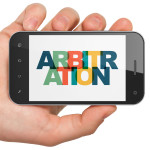
This lawsuit alleges that Amazon overstated the extent of discounts it offered customers (in stating the extent of the discount customer achieved when shopping at Amazon versus competing retailers). Amazon moved to compel arbitration, and the court grants the motion….

Tauheed Epps is a rapper known as “2 Chainz”. While backstage at one of his concerts, he allegedly filmed plaintiff while walking around backstage with his entourage, and repeatedly called her a “THOT” (which stands for “That Hoe Over There”)….

In March 2013, Susan Harvey bought a game via Google Play, which required her to electronically link her bank account. She alleges that hundreds of unauthorized charges hit her bank account, totaling thousands of dollars. Google allegedly offered to make…

Plaintiff, while he was in custody, created a fake Twitter account in the name of “Frank Zamiara” with the user name “LitlZeezy”. The account “was meant to act as the voice and alter ego of [an] abusive deputy.” It was…

By Guest Blogger Laura Heymann [Eric’s introduction: Prof. Heymann has spent more time thinking about the Law of Naming People and Things than anyone else I know. I asked her to weigh in on the potential implications of the Federal…

Plaintiffs sued American Eagle Outfitters and Experian, alleging claims under the TCPA for unwanted text messages. American Eagle is the retailer, and Experian provides marketing services. But neither of these entities actually pressed the “send” button. We’ve seen disputes over…

In October, a court issued a really interesting and decisive Section 230 defense win. I ran out of time to blog it, but a recent follow-on ruling gives me an opportunity to ccover both rulings. The October Ruling Roca Labs…

As you recall, the Consumer Review Freedom Act would prevent businesses from restricting consumers’ reviews of their businesses. This week, the Senate approved the bill by unanimous consent. On the floor, the sponsors introduced a new version of the bill….

Most of us uploading YouTube videos aren’t deeply invested in their continued availability. If YouTube removed our videos or relocated them to a different URL, we might be puzzled why but otherwise would probably shrug our shoulders. However, YouTube is…

